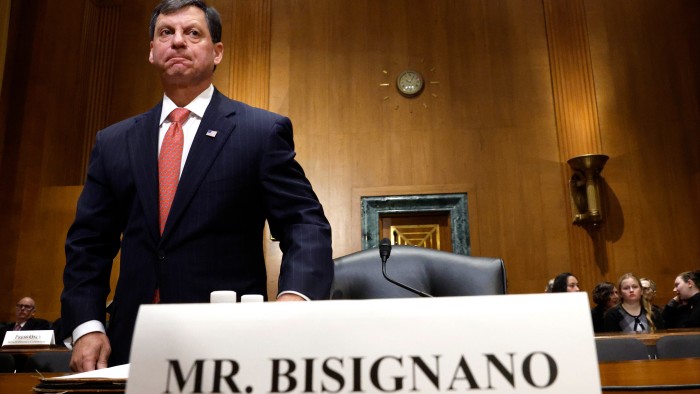Eleven months ago, when Donald Trump nominated Fiserv CEO Frank Bisignano to run his administration, his company was hailed as a Wall Street fintech darling, along with Visa and Mastercard.
Now, the business Bisignano helped build is in decline.
Shares of Fiserv, which operates back-end technology for banks and payment networks, fell 44%, shedding $30 billion in market capitalization, following dismal third-quarter results on Wednesday. Analysts called the results “shocking” and “impossible to bring to light” as the company disclosed several problems that had been festering for years.
But Bisignano had already raised money when he was confirmed by the Senate in May by selling 3.3 million shares of Fiserv stock worth more than $500 million and deferring taxes on the gains. The stake is now worth about $220 million.
Questions are now being raised about the company’s management under the leadership of Mr. Bisignano, who was appointed by President Trump to manage the Internal Revenue Service and the Social Security Administration, two of the government’s most important financial operations. One collects more than $5 trillion a year in tax revenue, and the other pays out more than $1.6 trillion a year to seniors.
“To see a company that had such a strong reputation 12 months ago go down like this and end the day down 44% is the most shocking earnings report I’ve seen in my time covering this space,” said Nate Svenson, an analyst at Deutsche Bank.
Mike Lyons, Fiserv’s new chief executive since Bisignano resigned in May, said his analysis revealed unfortunate decisions to defer investments and cut costs, as well as a reliance on short-term efforts to maximize quarterly results.
“As a result, we have made the decision to deprioritize our near-term revenue and expense initiatives, which naturally has a short-term impact on our growth and profitability,” Lyons told analysts.
The company is currently facing a shareholder lawsuit for misleading investors. Fiserv declined to comment. Bisignano did not respond to requests for comment.
Wisconsin-based Fiserv was founded in 1984. The current company was created as a result of Fiserv’s merger with First Data, where Bisignano served as CEO.
The deal combines Fiserv’s strong but low-growth core banking systems business with First Data’s high-growth merchant solutions business, which provides payment processing systems such as credit card readers and e-commerce services for small and medium-sized businesses.

Mr. Bisignano, 66, was the chief executive officer of JPMorgan Chase & Co. before Fiserv and First Data were formed, reporting directly to CEO Jamie Dimon. Within the company, he earned a reputation as a savvy operator, but also someone who could blur the line between company affairs and personal life.
Mr. Bisignano was known for inviting family and friends to the corporate box at MetLife Stadium to watch the New York Giants NFL team, even when he wasn’t in attendance, and for frequently flying on the company’s private plane, according to executives who worked with him at the time.
Mr. Dimon’s relationship eventually soured, and he left JPMorgan to join First Data in 2013, according to people familiar with the matter. In 2017, his payroll at the company reached $100 million. JPMorgan declined to comment.
Bisignano acquired the combined company of Fiserv and First Data in 2020. The company has outperformed rivals such as FIS and GPN and emerged as an industry winner. Fiserv’s standout business was the Clover POS payment terminal.
Bisignano and his wife, Tracy, were major donors to Trump’s 2024 and 2020 presidential campaigns until Trump was hired for the newly created role of head of the Internal Revenue Service, which runs the Social Security program and reports to Treasury Secretary Scott Bessent. A Treasury spokesperson did not respond to a request for comment.

In October 2024, weeks before Election Day, Tracy donated $924,600 to the Trump 47 Committee, the highest amount an individual can donate to a community chest pack, and nearly $800,000 was distributed to the Republican National Committee and dozens of local Republican groups.
Fiserv’s image as a stable business with solid growth potential has been shattered. The company on Wednesday reported quarterly results that significantly missed analysts’ expectations, lowering its outlook for organic revenue growth in 2025 to a minimum of 3.5% from 10%.
Lyons detailed that the company’s operations in Argentina, supported by the country’s high interest rates and hyperinflation, have been a bigger driver of growth than investors previously thought. He talked about reversing price increases made by previous management and the need to “completely overhaul” the customer experience for Clover products.
Recommended
“There was a lot of restructuring at Fiserv, a lot of cost cutting, and I don’t think there was investment where it needed to be,” said Ali Raza, managing principal at Blue Leviathan, a payments consulting firm. “So we have what we have now.”
Lyons is now tasked with turning the company around. He installed a new chief financial officer, three new directors and a new co-president.
He talked about resetting the company’s culture to one that prioritizes integrity, fairness, execution, accountability and customer service, but it will take time to realize that change.
“Regardless of what’s going on with the finances, it’s not something you can wave a magic wand and solve overnight,” Germany’s Svensson said.



